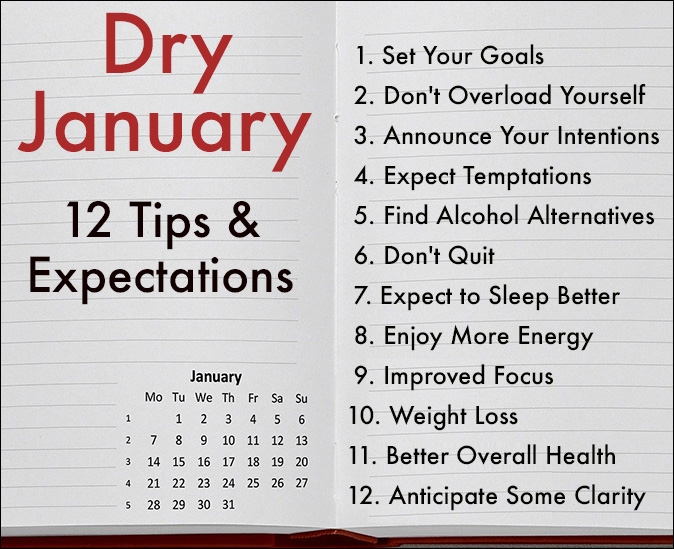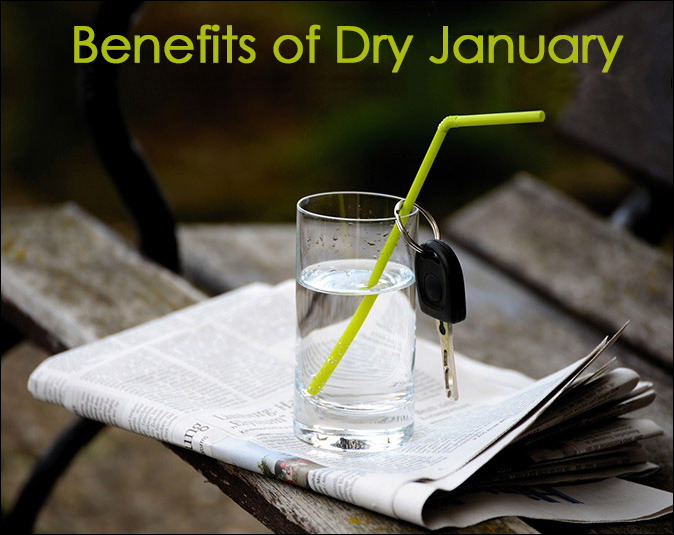
New Year’s resolutions can feel like a formula for failure, especially if we’re trying to change unhealthy habits like consuming too much alcohol. Enter Dry January, a social movement widely attributed to a campaign started by a nonprofit organization in the UK around 2014.
Dry January was such a resounding success in the UK that the movement has hopped the pond and become popular here in the United States too.
Plan for Dry January
Besides not having to deal with hangover symptoms for an entire month, taking 30 days off from alcohol at the start of the year is an excellent way to gain some health benefits and examine our relationship to alcohol.
For heavy drinkers, defined by the Centers for Disease Control and Prevention (CDC) as 15 drinks a week for men and eight drinks a week for women, it may not be wise to quit “cold turkey.”
Scaling alcohol consumption back gradually, before going completely sober, can help avoid or ease potential withdrawal symptoms.
If scaling back, or stopping drinking altogether, sounds impossible, you may need to consider professional treatment for alcohol addiction.
Whatever your particular situation, it’s important to go easy on yourself, don’t get discouraged, and have a Dry January plan in place for success.

12 Tips and Expectations For a Prosperous Dry January
1. Set Your Goals For Dry January
This is always first on the list because it’s important to know exactly what you want to get out of a month of sobriety for Dry January.
For instance, it may be too much pressure to start on January 1. That’s okay. Starting on January 3rd and going to February 3rd is just as acceptable.
2. Don’t Overload Yourself
With resolutions, we have a tendency to take the “kitchen sink” approach and toss in every unhealthy habit we have, as if we can transform our lives in one 30 day fell swoop. This is a mistake and can result in failure and a negative emotional setback.
Focus on avoiding alcohol first, and along the way, you can make plans to address other habits. You might even notice the clarity you get from not drinking will benefit you in ways you hadn’t expected.
3. Announce Your Intention About Not Drinking for Dry January
This doesn’t mean blasting out your Dry January plans on social media or to all the contacts in your personal email list.
However, telling those closest to you that you’re not drinking in January can help keep you accountable and is likely to inspire support from those who care about you and your wellbeing.
To make it easier on yourself and beneficial for others, find friends to join you to go sober for the month.
4. Expect Temptations and Urges
Often times we start resolutions with a chest full of determination and resolve, only to hit the week and a half mark and want to drink with friends or have a cocktail after a particularly long or difficult day.
The urge to drink is inevitable. Knowing it’s coming offers an added layer of protection, which brings us to tip number five.

5. Prepare Alternatives to Alcohol
When the urge to drink comes over you, have something ready to combat it. It might be as simple as taking a walk, a bike ride or even some mindful meditation to clear your mind and reset your intentions.
Additionally, if you’re someone who tends to drink at a particular time, such as after work or before dinner or on the weekends, simply have a nonalcoholic beverage of some sort in your hand instead. The tactile replacement can help avoid the urge to drink alcohol.
6. Don’t Quit Because of Mistakes
This is that sort of “all or nothing” thinking that can be self-defeating. Sometimes we let our guard down and have a drink. It’s not the end of the world and doesn’t mean we’ve failed.
No one is perfect, and a mistake does not mean we have to keep drinking. Just accept the misstep and recommit to your original goal date.
7. Expect to Sleep Better During Dry January
While alcohol might help you fall asleep faster, it actually disrupts the quality of restful sleep throughout the night.
It might even be difficult falling asleep in the first few days, but fear not, most people start to experience more restful and regenerative slumber without alcohol.
8. Look Forward to More Energy
With better rest comes greater vigor. Additionally, alcohol forces our body and liver to process its toxic byproducts, which can affect overall energy and wellbeing.
A great way to handle more energy is to move or exercise more often. Try to get at least 30 minutes of vigorous activity a day, whether it’s a brisk walk, hike, run or more intense forms of exercise. Your body will thank you.
9. Expect Better Concentration and Focus to Start the New Year
Another great benefit of staying sober for 30 days is improved concentration and focus.
Even on days when we don’t necessarily feel hung-over from a night of drinking, regular alcohol use or abuse can leave us feeling mentally foggy and slower than our true potential.
10. Be Prepared For a Little Weight Loss
This will certainly vary for individuals, depending on how much or little they normally drink, but some weight loss is likely because alcohol is extremely high in empty calories that the body turns into sugar and stores as fat.
Cutting out alcohol can have the same effects as a no sugar diet for many people.
What’s more, the added energy you feel might have you living a more active life and making better dietary choices, all of which add up to more calories burned.
11. Expect Better Overall Health
Alcohol takes a big toll on the body, even in moderate but regular amounts. It creates inflammation, damages the liver, heart, and even takes a toll on muscles and skin.
While 30 days sober won’t necessarily reverse all of the negative health side effects, it is certainly a good start. In fact, you might notice how differently you feel and drink less going forward, which is also beneficial.
12. Anticipate Some Clarity
Taking a 30-day break from alcohol will, no doubt, give you perspective on your relationship to drinking. You might find that your life changes very little without a few drinks here and there and that’s fine.
Others, however, might realize that their alcohol habits lean toward dependency or addiction, and that not drinking is a far better choice for a healthy life.
However you feel at the end of 30 days sober, don’t be afraid to embrace it and, if necessary, explore help for recovery if the newfound clarity points to a possible problem with alcohol.
Many people find a healthier and happier life on the other side of 30 days sober after Dry January.
Related Posts
- Dry Drunk Syndrome and What is a Dry Drunk?
The term Dry Drunk Syndrome, or simply Dry Drunk, refers to a person who quit…
- Bob Forrest's 11 Tips for Surviving the Holidays
Leave it to a recovered junkie to say what everyone is actually thinking about the…
- How to Increase Serotonin Naturally - Serotonin Foods and Tips
Learning how to how to increase serotonin is beneficial because it’s a natural mood booster…
